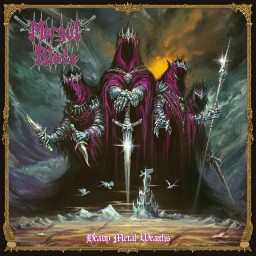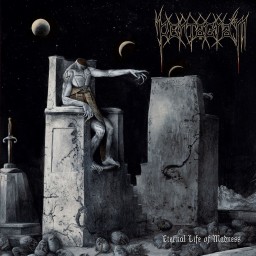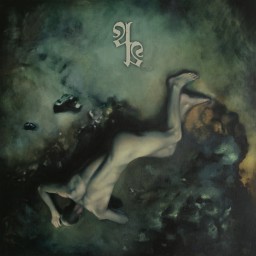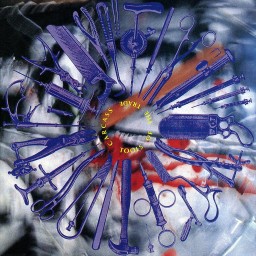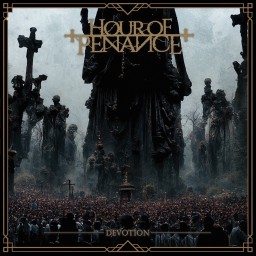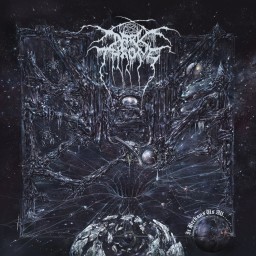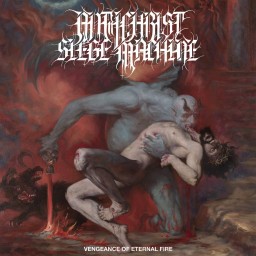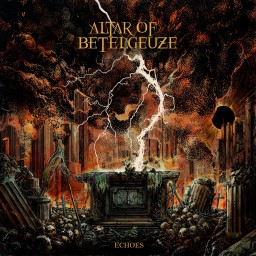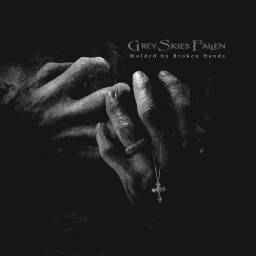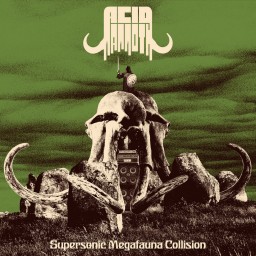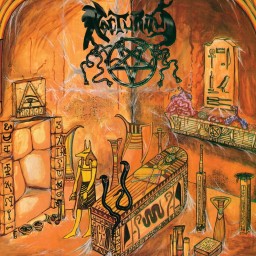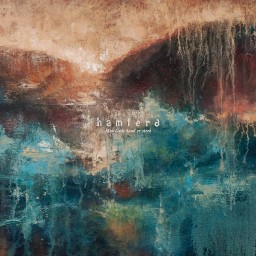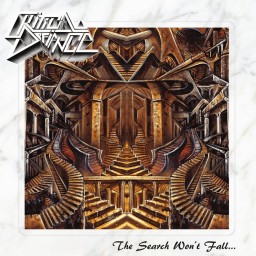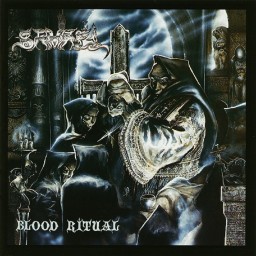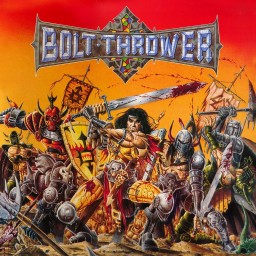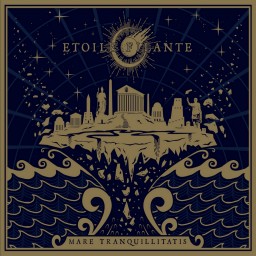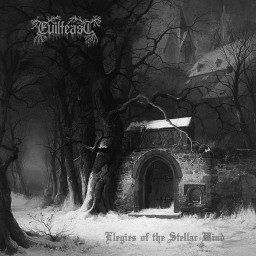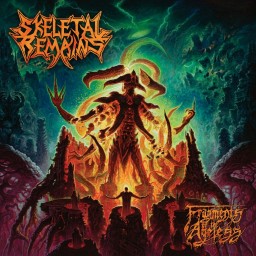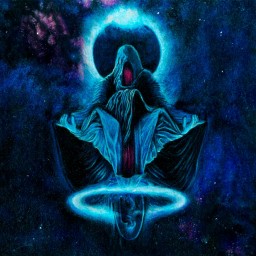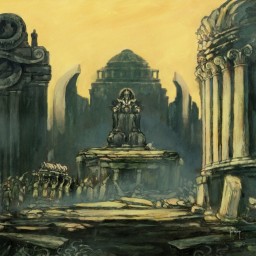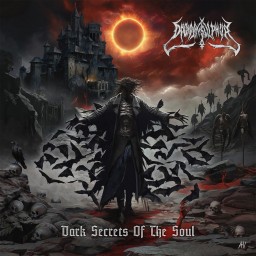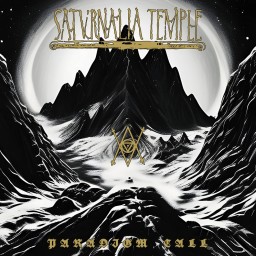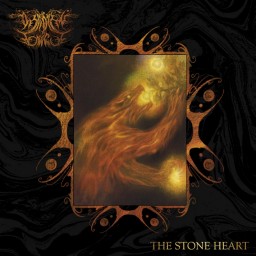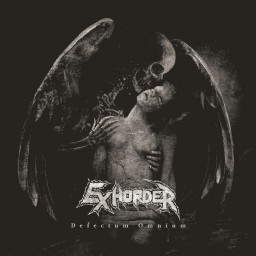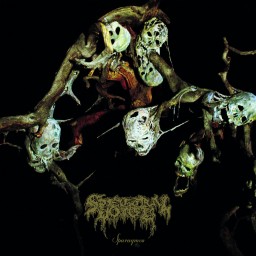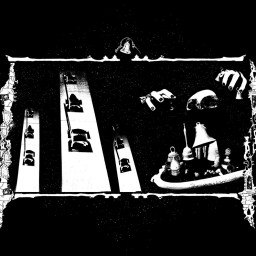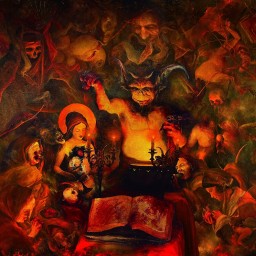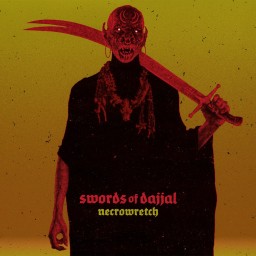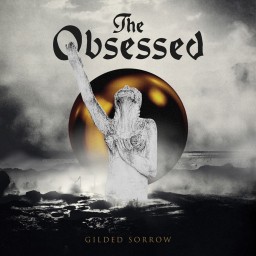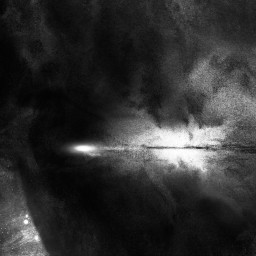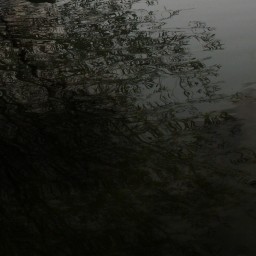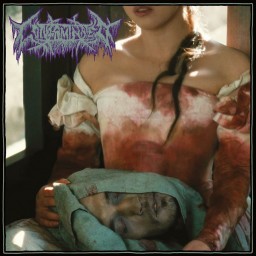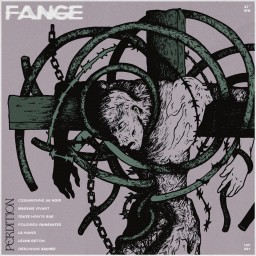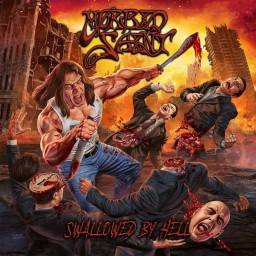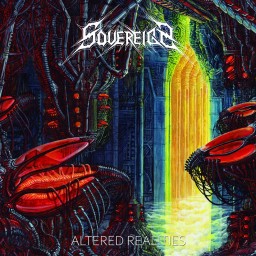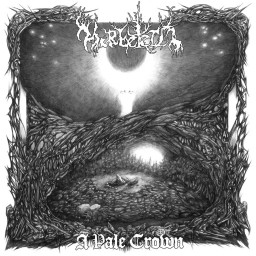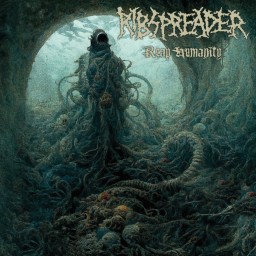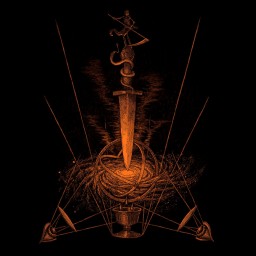Sonny's Reviews
I was quite interested by Morgul Blade's debut album, 2021's Fell Sorcery Abounds, with it's combination of traditional heavy metal with black metal vocals, but ultimately it sounded better in theory than in practice. It wasn't bad, but it didn't grab me as much as I had hoped it would. Anyway, here we are, two and a half years and a couple of personnel changes later with the Philadelphians' sophomore, Heavy Metal Wraiths. Guitarist Jason Hiller has been replaced by Heavy Temple's Elyse Mitchell (aka Elyse NightHawk) and bassist Dan JD has been superceded by Wild Beyond's Jim Viola. The personnel changes seem to have made a big difference, with the band sounding much tighter than on the debut which I felt got a little bit sloppy at times. The production is excellent with all the elements of the band being perfectly audible and the overall sound being thick and crunchy, from steel-coated riffs to crisp drum fills and thundering bass lines. I must make a particular mention of drummer Will Spectre at this point, who sounds amazing throughout with his energetic and entertaining fills supplementing his sterling work as timekeeper.
Musically they have their feet well and truly planted in the 80s with an arterial line of ascension leading straight back to the stalwarts of early USPM and european trad metal, deploying galloping riffs, melodious leadwork and a tireless rhythm section. Then, of course, there are Klauf's black metallized vocals that instill the tracks with a snarlingly vicious edge and which solves one of the major hurdles I have to overcome with any number of traditional and USPM-derived bands and that is the overt histrionics of some of the frontmen. Musically I like a lot of power metal, but I find the majority of the singers intolerable, so Morgul Blade are tailor-made for me. I guess there are those that will counter this by arguing that the vocals are restrictive compared to those employed by the more theatrical exponents of the art and I can understand that argument, but for me personally, lacking in range though they are, Klauf's blackened snarls just resonate with me so much more than some elaborate glorified air siren that dominates proceedings with attention-seeking wailings. Interestingly, they throw in a couple of curveballs with the short interludes "Widow's Lament" and "A Welcoming Hearth". The former is a clean-sung celtic folk song that I found worked really well in context here and it, along with the opening bars of "Spider God", very much reminded me of Solstice's New Dark Age album where "Blackthorne/The Keep" segues into "Cromlech", a transition I absolutely love. The other interlude, "A Welcoming Hearth", takes the form of a short electric piano and synth-driven electronic piece, which is less out of place than it sounds, following the synth-heavy ending of preceeding track "Razor Sharp".
Funnily enough I found the opening couple of tracks to be the least engaging and it wasn't until the title track, the album's third, that things really kicked into high gear. It, along with "Razor Sharp" and "Neither Cross Nor Crown" all really hit the spot with me and illustrated best how far the band had come since the debut. Ultimately, Heavy Metal Wraiths is an album of good, old-fashioned metal with hook-laden riffs that will be playing around in your head long after the album has ended and has a vitality that stems from songwriters that understand what makes heavy metal great for those who love it.
As an afterthought - and I don't know if it has any relevance - but the artwork shows four hooded, Nazgul-type beings whereas the debut only had a lone hooded figure and I wonder if this is a reflection of a new dynamic within the band, whereby Klauf viewed the earlier material as his own and sees this later release as more of a band effort. It certainly feels that way and is better for it.
Genres: Heavy Metal
Format: Album
Year: 2024
Pentagram, aka Pentagram Chile, despite being formed almost forty years ago, return in 2024 with only their second full-length album, eleven years after their debut, The Malefice. They did, however, knock out some killer demos back in the 80s and deserve at least a line or two in the book of thrash metal. In fact, truth be told, they deserve more than that because I am sure they have been a big influence on any number of the top-drawer thrashers emerging from Chile over the last few years. New album, Eternal Life of Madness, has eleven tracks and runs for a feverish fifty-five minutes. Pentagram's version of thrash metal sits very comfortably at the deaththrash end of the spectrum and, in truth, is content with medium-paced tempos that sometimes slip into almost doomy territory, with The Seeds of the Deed and Omniscient Tyrant in particular reminding me of Celtic Frost's slower moments. In fact, they do a very good job of varying their pacing, The Portal, for instance, has incendiary moments where they let rip with some real heads down thrashing, but they also throttle it back for a more ominously threatening vibe.
On the whole Eternal Life of Madness is a very solid entry into the modern thrash metal canon with excellent production values and a high level of technical competence, but the truth is that Pentagram, despite being an iconic name in the chilean thrash world, have some stiff competition from some of their younger countrymen such as Demoniac and Critical Defiance and I am not 100 percent convinced they have reached the same level, especially in the songwriting department, as those two with their latest. Don't get the wrong idea, this is still really good, I am merely playing devil's advocate and suggesting that time hasn't necessarily strengthened Pentagram's hand. Omniscient Tyrant, Icons of Decay, the extremely Slayer-ish, Devourer of Life and Deus est machina are all most definitely worth the time of any red-blooded thrasher and outdoes any number of pretenders. Look, if you love South American deaththrash then get your sweaty mitts on a copy of this and I'm sure you won't be too disappointed - I'm not, despite any minor niggles I may have.
Genres: Death Metal Thrash Metal
Format: Album
Year: 2024
Above Aurora are a duo hailing from Poznan in Poland, comprising drummer "O" (Oktawiusz Marusiak) and vocalist, guitarist and bassist, "V" whose only other known alias is "KW". Forming in 2015, "Myriad Woes" is the duo's third full-length, although my own experience with the pair only encompasses their 2016 debut, Onwards Desolation, with it's blend of black and doom metal very much appealing to me.
Myriad Woes kicks off with it's longest track, the haunting "Inner Whispers" which is, essentially, an instrumental, although it utilises several voice samples of people discussing serious mental health-related issues. It takes a number of twists and turns throughout it's eleven minutes from an introspectively ominous opening post-rock build-up, laced through with mounting doom-laden tension which ultimately resolves into a blasting black metal explosion of violence. It is an incredibly thoughtfully constructed track which makes for one hell of an impactful opener and leaves the listener with decidedly disturbed emotions (well it did for me anyway). Second track, Spark, is a much shorter, more straightforward affair, with a mid-tempo doomy riff dominating and V's hoarse bark providing vocal accompaniment, before kicking into high gear for the run in. It's a decent track, and after the emotional wringer of Inner Whispers it allows the listener to get back on an even keel emotionally, although following such a titanic track it feels a little slight and almost a bit disappointing, to my ears.
Elsewhere, Above Aurora like to draw on a couple of different influences with the "bounce" of sections of "Horns of Dread" giving it a vaguely post-punk feel at times and the occasionally jangling guitar work sounding somewhat goth-influenced. I think it is also fair to point out that the doom metal component is not as overt as previously, meaning Myriad Woes isn't a genuine black doom hybrid, but rather the doominess manifests as an ominousness of atmosphere and adds heft to the black metal riffs which beefs up the overall sound. So, if pushed, I would summarise it as a mid-tempo black metal album with a particularly dark and oppressive atmosphere, laced with the occasional haunting melody that also gives vent to aggressive outbursts of blastbeat-driven violence. It is actually quite a brief album, it's five tracks amass a mere thirty-three minutes runtime, but it is so proficiently put together that no moments are wasted or superfluous and come album's end the sensation, certainly that I experienced, is one of having listened to a very substantial release that has delved into the darker recesses of the human psyche and laid them bare. Above Aurora have illustrated here that it is possible to put together a thoughtful and affecting black metal album that can still utilise melodic passages and doesn't have to rely on dissonance and avant-garde stylings to create unease in the listener, but rather achieve it through skillful songwriting and atmosphere creation. I am very much impressed at Above Aurora's development since the 2016 debut and will endeavour to keep an eye on them going forward.
Genres: Black Metal
Format: Album
Year: 2024
I believe the tracks on this EP were recorded during the Necroticism sessions, that much seems quite apparent anyway. The opening title track is the only previously unreleased track and I must admit that I am quite taken with it, it still hangs on to some of the earlier grind influence and although it was clearly recorded later, it sounds similar to "Swarming Vulgar Mass of Infected Virulency" and easily could have been on Symphonies of Sickness, my personal favourite Carcass album. Second of the four tracks on offer here is Incarnated Solvent Abuse, lifted straight from Necroticism and is a worthy addition, it being one of the band's most recognisable and well-loved tracks, it's melodic chug always able to get the old head nodding.
The other two tracks are both re-recordings and are worthwhile additions here, if only as an illustration as to how good early Carcass' songs were when the production is polished up. First of the two is Pyosified (Still Rotten to the Gore), originally on Reek of Putrefaction which here is like a polished diamond compared to the original Reek version with it's demo-quality production values drowning most of the guitar work. Here the main riff is freed from the chains of poor production to reveal it's full galloping glory and allow a reappraisal of just how great a riff it is. The second re-recording is "Hepatic Tissue Fermentation II" the original of which I am unfamiliar with, it initially appearing on the 1989 Pathological Compilation, the first release from Pathological Records, alongside tracks from the likes of Napalm Death, Godflesh and Coil. At six-and-a-half minutes it's an epic early Carcass track and here it sounds very impressive, combining the later pure death metal sound with their earlier grind tendencies with significant pacing variation, to produce a track that would sound very much at home of Symphonies of Sickness.
These tracks are all now available on later-released comps, but at the time I am sure this would have been a very interesting insight into the Carcass story and would signal the end of one era of the band, prior to their embarkation upon the melodic death metal journey they undertook from the following year's Heartwork onwards.
Genres: Death Metal
Format: EP
Year: 1992
My only previous dalliance with Italy's Hour of Penance was their previous album, 2019's Misotheism, an album about which I can remember very little, but which I see I scored as a 3/5, so evidently I wasn't greatly impressed at the time. However I have come a long way in my appreciation of death metal in the intervening five years and I went into Devotion with a clean slate. My initial impression is that the technical death metal tag is a little bit misleading as it doesn't exhibit too much of the chop-and-change, staccato style I assosciate with a lot of tech-death. Although I understand that style is incredibly well thought-of, it actually does very little for me (except in rare cases) so Devotion's technically very sound, but fairly conventionally-structured style of death metal is much more palatable to me.
The production is excellent and the sound is crunchy and thick, investing the riffs with a huge amount of heft that is perfectly suited to their brutality. Giacomo Torti's skinswork deserves praise, being precise, powerful and tireless in it's thunderous supporting role, driving the riffs along at pace and displaying mastery of the kit without resorting to excessive showiness. This lack of showiness seems to be the band's whole ethos, illustrated admirably by the tightly-played and effective guitar solos which display impressive technical skill without resorting to any kind of showboating and imbue the tracks with a keen cutting edge. There is very little let-up in the album's pacing, with most of the ten tracks fair hurtling along, yet always in a controlled manner with the band never letting their need for speed get the better of them. Paolo Pieri's bellowing roars are the focal point for the band's rage, sounding supremely aggressive and imtimidating for the entire runtime, he sounds like a man barely able to contain his fury at the world.
The thing is, though, impressive though the individual tracks and the musicianship is, they do tend to blur into one a little bit, with only the occasional hymnal motif providing anything like a variation to the blistering brutality. I found plenty to enjoy here, but if I were being hyper-critical, I would say that, as a whole and under repeated listens, the album starts to sound a bit sterile and doesn't really impart too much atmosphere or emotion other than an unchanging inherent violence. I know, it's f---ing death metal, what do you want, right? Well I think I prefer it a bit sloppier but more engaging to be honest.
Genres: Death Metal
Format: Album
Year: 2024
I can't believe that eighteen months have already passed since an ice skating Fenriz heralded the arrival of "Astral Fortress", but here we are and, in what is becoming quite the regular occurance, Darkthrone are back again with a new album, entitled "It Beckons Us All". It very much continues the direction of travel of their last few albums, even going back to 2016's "Arctic Thunder", when they started introducing a doominess into their crusty heavy metal sound. Along with Eternal Hails and Astral Fortress this now forms another unholy trilogy for the duo where this crusty trad doom sound has been fully realised into, what I like to call, necro-doom. Obviously nowhere near as influential or seminal as the original unholy trilogy, I think that it is significant that Darkthrone can still deliver the goods more than three decades on, having carved out a niche for themselves in the metal world, where they are pretty much unrivalled at what they do, never becoming dragged in by whatever is trending in the wider world of metal, consistently delivering quality material and with a knack for writing killer riffs which very few can aspire to.
After a few brief seconds of a 1950's sci-fi movie-style synth intro, opening track, Howling Primitive Colonies, kicks off with a marvellously infectious and memorable riff and sets the tone for the album as a whole, taking the early Nineties' trad doom sound of lesser known lights like Penance or Revelation and performing the equivalent of burying it for thirty years so it acquires a rotted, musty odour, by using black metal production techniques and Nocturno Culto's croaky, blackened vocal style that gives it all a real necro sheen. If you have heard any of their new albums since 2016, then you will have an idea what "It Beckons Us All" sounds like, but it is here where that crusty trad doom sound reaches it's peak with some of their most memorable riffs in years. That opener has three killer riffs as it switches from the brilliant introductory riff into a more sustainable and doomier, verse-carrying one which ultimately drops into an uptempo, gallop designed for maximum neck-wrenching action. Howling Primitive Colonies is a really strong opener and is one of the best tracks Darkthrone have written in this latest cycle of their existence, setting the album up in glorious style. Second track Eon 3 is obviously an extension of Astral Fortress' closer Eon 2, sharing themes with the earlier track and serving to tie the two albums even closer together.
The quality never dips either and, as much as I enjoyed Astral Fortress, I think It Beckons Us All... has seen this era of the band hit it's peak and may well be my favourite Darkthrone album since 1995's Panzerfaust. The riffs really are some of the best since the band's heyday of the early nineties and the production has cranked up that crunchy doom sound to a perfect pitch, sounding loads better than AF did. Black Dawn Affiliation, for example, sounds amazing, the crusty crunch of it's main riff providing a driving wall of sound upon which Nocturno Culto's vocals necrotic vocals inscribe the lyrics with Fenriz' drumwork perfectly placed within the mix to reinforce the track's momentum without stealing the thunder from the riffing. And those riffs just keep coming - "The Bird People of Nordland", the doomy "The Heavy Hand" and the longest track and closer, "The Lone Pines of the Lost Planet", all contain memorable and iconic riffs. Songwriting-wise, I think this is some of the tightest the duo have produced in some time, their occasional tendency to let things run away with them being kept under control in the main, allowing the tracks to flow really well and resolve themselves satisfactorily. Even the proggy twists and turns of "The Lone Pines of the Lost Planet" seem vital to the overall narrative and never come across as self-indulgent or padded.
For someone like myself who is already a massive Darkthrone fan, it's always an event and a joy when Fenriz and Nocturno have new material out, but this time around the duo have outdone themselves and totally exceeded my expectations. Two of my greatest musical loves are Darkthrone and doom metal, making It Beckons Us All... sheer nirvana and it will undoubtedly be sat very near the top of the tree when I start making my 2024 best albums list.
Genres: Black Metal Doom Metal Heavy Metal
Format: Album
Year: 2024
Antichrist Siege Machine are relative newcomers to the war metal scene, their debut EP hitting the stands in 2017, but they have taken the genre by the scruff of the neck and laid down some pretty brutal stuff in the seven years since. With latest album, Vengeance of Eternal Fire, ASM have really hit their groove with a release that delivers an all-out aural battery without the muddy production values that robbed so many of their predecessor's releases of any clarity. Yes, I know that muddy, chaotic sound was part of the appeal of early war metal releases from the Blasphemies of this world and I love that archetypal sound too, but here, thirty-five years on from those earliest canoniacal war metal classics, the genre has moved on from that and the best modern war metal acts don't need to hide behind poor production because they have the chops to produce brutal and blasphemous sounds whilst allowing the listener to actually hear everything they are doing.
Of course the basis of war metal is an unholy alliance of death and black metal, with varying proportions of each within the mix. ASM tend towards the more death metal end of the war metal spectrum, dropping occasionally into quite "groovy" slower death metal riffing, just enough to break things up and provide a little variety, but not so much that it distracts from the overarching blitzkrieg that comprises the vast majority of Vengeance of Eternal Fire and shouldn't be seen as any kind of treasonous act against war metal orthodoxy. The drums sit fairly prominently in the mix, so the blastbeats are given plenty of focus, almost as much as the blistering riffs. Interestingly drummer Scott "S.B." Bartley is also the vocalist, so it must be quite a feat when playing live for him to sing whilst launching salvo after salvo of blastbeats. His vocals actually seem to sit lower in the mix than his drumming, thus giving them a distant, buried feel, despite their bellicose viciousness. The high production values allow the listener to distinguish the riffs far easier than on old-school war metal releases and to appreciate the finer details which may have been lost in the past.
I must say, as much as I love OSWM, I do like the fact that a band like ASM employ a cleaner production style, which does make appreciation of the nuances of war metal much easier - and I say this with no ironic intent because it is obvious that, despite the inherent (almost) continuous blasting and breakneck riffing, that these guys really have great command of their instruments and their overall sound is tight, aggressive and technically solid. At the end of the day, they write killer riffs, have a powerful delivery and are extremely capable of capturing the witheringly blasphemous intent of true war metal. For me this is the band's best release to date and call me heretic if you must, but I think this is capable of standing against the very best that war metal has to offer. To (mis)quote the intro to the Fallout 4 video game "war metal... war metal never changes". Except when it does!
Genres: Black Metal
Format: Album
Year: 2024
Altar of Betelgeuze are a finnish band playing doom metal with some death doom tendencies which hardly anyone seems to know about and even less of those who do could give a shit about. This is a great shame because I actually think they are pretty good, or at least I thought their 2014 debut album was. Unfortunately I, along with almost everyone else, missed their sophomore, 2017's Among the Ruins and now we are here, seven years, one pandemic and one european war further down the line with their latest offering, simply titled "Echoes". The album contains seven tracks, most of which fit snugly in the five to six minute bracket, with only the title track providing a longer workout at nine minutes, for a concise forty-two minute overall runtime.
Musically, Altar of Betelgeuze play a recognisable brand of finnish doom metal that is all about the riffs, which are crunchy and generally mid-paced, beefed up by a bass that follows the main thrust of said riffs fairly closely and coupled with efficient and unshowy drumming. Anyone familiar with bands like Lord Vicar, Spiritus Mortis and Cardinal's Folly should quickly be in recognisable teritory here. Where AoB depart is in the vocal department with singer Matias Nastolin, who also provides bass and some guitar, often delivering the lyrics in a deadly death metal barking growl, as opposed to the cleans of those other finnish doomsters I mentioned, unsurprisingly really, as he is also guitarist and vocalist for death metallers Decaying. This leads to them being tagged as death doom, but I think that is misleading because this is actually pretty conventional doom metal that utilises growled vocals rather than genuine death doom. The slightly quicker-paced Embrace the Flames is really the only track that approaches death doom and even then, not really.
Now, while it is certainly true that Echoes doesn't really offer anything new to the scandinavian doom metal canon, it presents some great riffs with a satisfying heaviness and memorability, a vocalist who varies his delivery and is actually an exceedingly capable singer, certainly better than a number of more well-known doom metal singers and a capable bunch of musicians whose playing provides a tightly focussed album of well-written tracks that give off a menacing and ominous atmosphere. So, if you have any love for conventional doom metal of the scandinavian variety then Echoes will definitely give you your fix of thick and heavy riffs. I mean, come on, the title track is actually a bit of a beast and I can already see the album as a whole sitting well up my list of best doom metal releases of the year.
Genres: Doom Metal
Format: Album
Year: 2024
Formed in 1996 as Eve of Mourning and fast approaching three decades of existence, Grey Skies Fallen are another one of a plethora of seriously underrated doom metal bands. None of the New York four-piece's six albums have even got to the modest heights of 100 ratings here on RYM, which is a great shame as these are clearly a talented bunch of musicians who deserve more recognition.
The band's approach to songwriting is quite progressive, with a number of shifts in tone during each track which lends them a story-telling, narrative feel. They don't stick to out and out doom metal, nor do they focus on just one style, but rather draw together strands of death doom, epic doom, conventional doom, gothic metal and progressive metal into grand, epic soundscapes that are imbued with an imperial bombast, yet are also tinged with melancholy and regret, like visiting the ruins of a once mighty empire, whose glory days are a distant memory. As well as a deft skill for writing a certain kind of bombastic doom metal, Grey Skies Fallen are also extremely adept performers, with the band sounding exceedingly tight. Guitarist Rick Habeeb also provides vocals and has a fine voice, with convincing deathly growls as well as really nice, soaring cleans and is never left wanting. Interestingly he is also vocalist with grindcore crew Buckshot Facelift, illustrating just how versatile a singer he really is.
The doomy riffs display a nice range of variety from the gloomily gothic a la My Dying Bride to the bombastic and epic, straight out of Rich Walker's Solstice song book, and all points in between. In fact, I would suggest Rich is quite the influence for Grey Skies Fallen because a sizeable proportion of the soloing sounds like it is delivered by guitarists well-acquainted with Solstice's New Dark Age album. In fact the more I listen to this, the stronger the comparison with New Dark Age grows, with even the production sound being similar and anyone who knows my view on NDA knows that is definitely a good thing in my eyes (or ears, as the case may be). I think this is an album that benefits from repeated listens and a cursory exploration may fail to unpeel it's layers, leaving the listener unfulfilled, but time getting to know it is time well-spent as I found it getting better every time I returned to it. I would also suggest listening to it on a decent set-up as I suspect a phone speaker almost certainly won't do it justice.
Ultimately Grey Skies Fallen are superbly talented musicians and songwriters who have languished in obscurity for far too long and Molded By Broken Hands is a high quality doom metal release that deserves a far wider audience than it is likely to garner.
Genres: Doom Metal
Format: Album
Year: 2024
A band called Acid Mammoth and an album titled Supersonic Megafauna Collision will probably hold very few surprises for anyone who has even remotely been paying attention to the metal scene over the last few years. Yes, predictably enough, these Greeks play super-heavy stoner doom metal with psych-inflected guitar solos and washed-out vocals. Their adherence to the cliches of the genre will, I'm sure, have people asking, "well how many Acid Mammoth albums does anyone actually need?" In truth, if you aren't too sold on this style of doom then one is probably sufficient, but as someone who has always embraced psychedelia and stoner culture, I genuinely enjoy Acid Mammoth's unpretentious approach to the genre and usually snap up anything they issue.
Guitarist / vocalist Chris Babalis Jr. has a quite high-pitched, nasal singing style which sounds like a mix of Never Say Die-era Ozzy and Tobias Forge of Ghost and as such may not be to everyone's taste I suppose, but for me it is perfectly adequate and suits this style of psych-stoner doom well enough. The riffs are thick and fuzzy, groove-laden monsters with plenty of "oomph" that instill a stoned-out hypnoticism via repetition and provide the framework upon which the vocals and guitar solos hang. The rhythm section provide solid support for the riffs with solid, capable and decidedly unflashy work. Song titles like Fuzzorgasm (Keep On Screaming), Atomic Shaman and Tusko's Last Trip further illustrate where the band are coming from, with drugs, the occult and outer space providing the lyrical content for all the stoned-out madness.
It really is very simple, if you dislike bands like Electric Wizard and Cathedral then chances are you won't connect with Acid Mammoth either, but the converse is also true, so you pays your money anf you makes your choice. Me, I'm all in with the tripping pachyderm.
Genres: Doom Metal Stoner Metal
Format: Album
Year: 2024
Nocturnus are a band it took me a little while to get in to, but once I got to grips with their debut, The Key, I enjoyed it enormously. Nocturnus is a 7" EP from three years later and following some drama around the departure of founder member, drummer and vocalist on The Key, Mike Browning. Firstly, where you listen to it could make a difference to your opinion. I first found it on YouTube, but the sound is terrible, demo quality and muffled to hell, but the version on Spotify (which is listed as a 2001 release, so may be a remastered version) is much clearer-sounding and definitely superior to the YT version.
There are two tracks on offer here, totalling ten and a half minutes runtime. the "A" side is "Possess the Priest", which is a six-minute slab of glorious Morbid Angel-worshipping OSDM and is my favourite of the two tracks with the transitions from the slower sections to the quicker and vice-versa getting my fists pumping and blood rushing in a good, old-fashioned adrenaline surge. The keyboards are still very much present but, as with The Key, they are quite thin-sounding and merely act as atmospheric support for the riffs. "B"-side "Mummified" sounds a bit like Death during their transition phase from conventional death metal to to prog-tech-death gods and, songwriting-wise, pushes a little bit too far into tech death territory for my preference and, without Chuch Schuldiner's songwriting prowess, it ends up sounding too disjointed for me. Still, it doesn't outstay it's welcome and when coupled with such a great "A"-side the release as a whole works very well as a short EP.
Genres: Death Metal
Format: EP
Year: 1993
Coffins are one of those bands who are treated with contempt by a vast swathe of the metal-buying (or more accurately, metal-streaming) public for adhering to a formula they are comfortable with and which they replicate throughout their career as the primary means for expressing their artistic intentions. Bands like Coffins' refusal to continually push the envelope and experiment with new modes of expression seems to rub a significant number of people up the wrong way, but you know what, fuck 'em, I love the determination of these guys to populate the world with soul-crushing, cavernous and guttural OSDM, so if you are one of those people, then you know where you can shove your contempt because neither I nor Uchino and the guys could give a shit.
The riffs are thick and meaty with a crunchy, yet unctuous guitar sound that is derived from such purveyors of old-school, cavernous death metal as Autopsy and Asphyx, although it's more modern and cleaner production does actually downplay that foetid, echoing quality of older releases. Even so, Coffins' riffs still hit like a punch to the lower gut region. As is usual, they walk the tightrope between conventional death metal and death doom, not being shy in slowing down the tempo to ominously hulking and doom-ridden, yet changing up to faster, d-beat-driven moshpit-frenzy fare at the flick of a metaphorical switch. There is no flashiness from these guys, they don't try to embellish their sound or push the envelope in any way, everything they do is effectively functional, with a set vision that requires a particular, some may say basic, style of playing which they have perfected over the years to the degree where few can pull off this particular style better - maybe more skillfully, but rarely as effectively. Uchino's vocals are crusty and uber-gutteral, as if he is trying to replicate the sound Godzilla would produce if he was the vocalist with a death metal band rather than a world-saving (or destroying) prehistoric throwback.
At the end of the day, this is nothing more or less than "don't fuck with us" old-school, doomy death metal originally dragged from the pits of hell at the dawn of the 1990s and if that is your bag, then give this a listen, if it isn't then don't because there is no reason why this would change your mind, although how any death metal fan can't be fired-up by a track like "Domains of Black Miasma" is well beyong my capability to understand.
Genres: Death Metal Doom Metal
Format: Album
Year: 2024
Hamferð are a six-piece doom metal band from The Faroe Islands. They have been in existence since 2008, but this is only their third full-length release in all that time, their debut having seen the light of day back in 2013 after winning the Wacken Metal Battle competition at the Wacken Open Air festival in 2012 and it's follow-up hitting the shelves in 2018. I must admit, I have only recently got on board with these guys myself during a dive into exploring more obscure doom metal bands, but I found much to enjoy in both of their earlier releases.
The new album's title translates as "But God's hand is strong" and the lyrics are sung in Hamferð's native Faroese, relating the tragic tale of fourteen faroese whalers who lost their lives at sea in 1915, with the album's title being a quote from one of the survivors upon his rescue. Musically they play strongly melodic death doom with both growled and clean vocals provided by singer Jón Aldará (also of Iotunn and Barren Earth) who switches between styles, to good effect, often within the same track. The band as a whole are very proficient with a nice clean sound that perfectly suits their more melodic approach to death doom. This melodic approach doesn't seek to crush the listener under waves of heavy riffing, but rather attempts to affect them more subtly with sorrowful airs that worm their way into the consciousness, effecting a deeper sensation of melancholy than a merely bludgeoning approach would achieve. Occasionally they become very light of touch indeed, verging almost on the balladic, which may have come off as a bit corny, were it not for the consummate ability of Aldará who, vocally, never descends into overt melodrama, but who maintains a subtle earnestness throughout, for which he deserves great credit.
I may have given the impression that this is a lightweight album and even though it does like to paint it's sonic landscape with lighter shades, there are certainly heavy moments present. Opener Ábær kicks things off and drags the listener in with a suitably heavy, but also melodic main riff and penultimate track, Hvølja, is the album's heaviest with a monster riff that poses a real risk of crushing the air out of the lungs of the unprepared listener who may have been lulled into a comfort zone by some of the preceeding lighter moments. Elsewhere, second track Rikin features a scarily bellowing Aldará threatening to peel the paintwork with his growls on top of a thundering main riff that you feel at gut level.
Although Men guðs hond er sterk is a concept album, thankfully the music is always pre-eminent over the concept, so none of the tracks feel forced, with the possible exception of the final spoken-word piece, although it isn't at all jarring, especially as it is the final track. The overall impression I get from the album is similar in feel to some of Enslaved's later work, such as RIITIIR or In Times, only within a doom metal framework rather than black metal. I don't wish to downplay the others' contributions, but ultimately it is the astonishing vocal talent of Jón Aldará that strikes me more than any other aspect of the album and on the evidence of this he is one of the absolute best vocalists working in the doom metal field and his performance alone is worth the entry fee.
Genres: Doom Metal
Format: Album
Year: 2024
Critical Defiance are back with their third album in five years, looking to cement their position as one of the most kick-ass thrash bands in the world. Hailing from Valparaíso, they have been forged in the furnace of Chile's white hot thrash metal scene. This time around main man Felipe Alvarado has secured the services of guitarist Nicolás Young following his departure from Demoniac, joining fellow ex-Demoniac-er, drummer Rodrigo Poblete who has been a member of Critical Defiance since 2018 and has appeared on all of their albums to date.
The Search Won't Fall delivers on all the aspects of thrash metal we have come to expect from the chilean scene and Critical Defiance particularly. Hi-octane, thundering tempos and a blackened edge adding extra visciousness, along with technically tight performances and great production values equals energetic and thrilling thrash metal that destroys almost everything the genre has produced since it's heyday back in the 1980s. I guess there could be an argument that they are a bit over-the-top with their supercharged riffs, heightened aggression and searing soloing, but I think they keep a lid on it sufficiently that it never becomes self-indulgent or out of control, but rather comes over as an exuberant and glorious celebration of metal. The playing is phenomenal with Rodrigo Poblete's work behind the kit worthy of particular praise due to his powerful and busy style that, despite the crazy tempos he is sometimes asked to keep, never misses a beat. With three guitarists the riffs are incredibly strong and, despite the tempo, the guitarwork always remains distinct and razor-sharp, never losing focus or descending into blurry chaos as other, less skilled, thrash practitioners are wont to do.
Very few bands can pull off this level of aggression and sheer musical velocity within a thrash metal framework as successfully as these guys and I know I am starting to sound like a broken record in this respect, but the chilean thrash scene has rarely failed to deliver on quality over the last few years. Bands like Critical Defiance and Demoniac are at last seemingly receiving the credit they have long been due and no longer do they have to watch from the sidelines while lesser lights take all the accolades. Anyone who thinks thrash metal died off in the early nineties are missing out massively if they can't move beyond their old Slayer or Megadeth albums and start appreciating the young bucks from South America who are storming the barricades with a vigour and passion long thought lost to thrash metal practitioners the world over. If an album like The Search Won't Fall doesn't get you excited about thrash again, then I suggest that the problem is yours and not theirs. Me, I'm holding on for sheer life and going along for the ride.
Genres: Thrash Metal
Format: Album
Year: 2024
Whilst listening to Blood Ritual, it struck me how early in black metal's second wave 1992 actually was. Contemporary releases to this were debut albums from Burzum and Immortal and Darkthrone's first dive into black metal iciness, A Blaze in the Northern Sky. Surprisingly, though, Blood Ritual sounds far more like modern Darkthrone than it does their unholy trinity, with a lot of slower tempo riffing that feels more doomy than black metal, a path Fenriz and Nocturno Culto have been exploring with vigour over their last two or three releases, so in a way I guess black metal has finally come full circle.
Anyway, that aside, Samael were obviously influenced by their legendary countrymen, Celtic Frost, with the opening riff of Bestial Devotion sounding like it was ripped directly from the grooves of To Mega Therion. Most of the quicker-paced riffing here sounds quite thrashy and certainly has more in common with Tom G. Warrior than the tremolo riffing being touted at the time by their cutting edge norwegian black metal contemporaries. Add to this the beefier production and it is apparent that Samael aren't going to propogate the same kind of frosty atmosphere as the scandinavians, making the album more blunt force trauma than icy stilleto wound.
Of course that doesn't mean this is a bad album, in fact it most definitely is not. The extended attention I have afforded it over the last couple of days has seen me strengthening my impression of it, to the point where I believe it sits very comfortably between Worship... and Ceremony... and has an appeal all of it's own. Blood Ritual inhabits the space where the old becomes the new and feels a bit like Possessed's Seven Churches in that it inhabits a point of transformation that is more extreme than it's influences, but not quite extreme enough to attain the next level.
Performance-wise it is a step up from Worship Them with the less raw production also allowing for greater clarity, enabling the band members to shine. There are some cool riffs and most of the songs exhibit a degree of progression throughout their runtimes and although I wouldn't label any of the tracks as out and out classics, the likes of the standout track, After the Sepulture, along with Blood Ritual, Beyond the Nothingness and Bestial Devotion are plenty memorable and possess all the wallop I like in my metal listening.
Genres: Black Metal
Format: Album
Year: 1992
Despite making a massive contribution to the birth of metal, the UK hasn't been overly blessed with important acts in the more extreme sub-genres. There were, of course, the twin grindcore godfathers, Napalm Death and Carcass and a few notables in the doom metal arena, but otherwise it has been the US and Europe that have led the way since the early 1980s. The sole exception and lone british banner fluttering among the death metal hordes, was Coventry's Bolt Thrower. War Master was the Midlanders' third album, following the rough and ready, crust and grind-influenced debut, In Battle There Is No Law! and it's much more professional sounding follow-up, Realm of Chaos, which had heralded a direction-change with the band moving into more conventional death metal territory. War Master saw Bolt Thrower heading further in that direction, ditching the grind element altogether in favour of a slower, mid-tempo, more cavernous sound that has more in common with Autopsy than fellow Brits like Carcass.
I must be honest at this point and admit that, for me, Realm of Chaos marks the band's highpoint, striking a perfect balance between the crusty grind of the debut and their later, conventional death metal sound, but that doesn't mean that War Master is any great drop-off in quality, in fact, quite the opposite as it is still one hell of a great record. The riffs on War Master are fantastic, possessing an inherent level of brutality, whilst still exhibiting a degree of melodicism which renders them instantly memorable. The songwriting is very good, and although most of the riffs stay within the mid-tempo range, the band don't shy away from either slowing down further to hulking, death doom pacing, or putting their foot down and letting rip. Karl Willetts has a great death metal growl, almost stripping paint as he barks out the lyrics which deal almost exclusively with the terrors of war, that puts him near the top of my list of favourite death metal vocalists. Production-wise War Master is a step up from Realm of Chaos with a chunkier, more bass-heavy sound that allows Jo Bench's four-string performance to shine and which is more conducive to this type of slower-paced, war-ridden death metal.
The solos are mostly of the brief, squealing style favoured by many death metal stalwarts since they were introduced by Kerry King and Jeff Hanneman back in the day and whilst they are perfectly functional and fit well within the song structures, they aren't on anything like the same level as the riffs. Despite seeing criticism of it elsewhere, I actually really like Andy Whale's drumming on here as it has tons of energy and some nice touches, such as the military tattoo-like beats at the end of Afterlife.
War Master saw Bolt Thrower finally getting near to a sound they were striving for and, as a result, they have often been accused of regurgitating the same material over and over again for the rest of their career, which is a bit harsh and personally I think is bullshit. When a band has hit on what they see as a signature sound, however, I am sure there is a temptation to plough the same furrow again on subsequent releases, and although BT never strayed far from the template they established on War Master, such is the quality of their material that only the most demanding or churlish of death metal fans could complain at the results. Evidently, this is a full-throated roar of challenge from a band in full command of their abilities, producing one of the best albums of their career and spearheading the British fightback against the scandinavian and american death metal hordes.
Genres: Death Metal
Format: Album
Year: 1991
Well, this is a bit of a strange one, I must say. Mare tranquillitatis is an album of synth-heavy cosmic black metal, so your first question I would imagine is "So what is so unusual about that?" The strangeness comes from both the sound of the synths, which is of a vintage, 1970's type, typically employed by the likes of Hawkwind on their late Seventies and early Eighties albums and the prominence of said synths in the mix. In fact, for significant portions of the album, the black metal component seems to be acting in support of the synths rather than vice-versa. Yet, somehow the band make this work far better than I would have expected, even though I found it to be a little distracting at times.
The black metal component is reasonable enough, if not exactly earth-shattering, with a decent quota of fiery blasting and the vocals possessing the requisite distant-sounding banshee shrieks which we all expect as a minimum from our atmospheric black metal. But then, where your usual atmo-black album fills out the atmosphere with an additional layer using often quite reedy and thin-sounding synths, Etoile Filante go a whole other way and dollop on the retro-sounding synths in a way that often pushes them as the focus of the tracks. What I personally found especially distracting by this though, is how the synths often brought to mind other songs and set my attention wandering away from the matter at hand. For example, there is a point midway through the opener where the synths sound just like parts of the Queen soundtrack for the Flash Gordon movie and, similarly during the next track, Fragments de Poseidonis - d'après Atlantide de Clark Ashton Smith, they felt identical to the mid-section of Hawkwind's Damnation Alley from their 1977 Quark, Strangeness and Charm album, all of which pulled me out of the current listening experience. Of course, I accept that this is a personal problem and most likely won't be experienced by other listeners and the issue doesn't really arise outside of the first two tracks. Either way, the resultant album has an atmosphere I have not encountered too often in a black metal context. I find most cosmic black metal seeks to convey the frigid coldness of interstellar space and the awe-inspiring effect of sources of unbelievable energy such as stars and black holes within this frozen environment, whereas Etoile Filante seem to be taking a warmer, more human-centric view as expressed by the synth-work, which more evokes man-made environments such as starships or orbitals. The final couple of tracks, "Naufragés de l'océan d'onyx" and "Le vent des éternels" strike a much better balance between synths and black metal and, for me, are the best two tracks on the album and this is the main reason I leave the album in a positive frame of mind, I suspect.
I'm not saying it is by any means, but my main worry with Mare tranquillitatis is that, in the crowded black metal world, the untypical synthwork is a "gimmick" to enable it to stand out from the slew of black metal releases destined to hit our shelves and streaming platforms in 2024. It's certainly got me talking about it for one anyway. I hope this isn't the case and the guys are all-in with this from a purely artisitic viewpoint because even though it sometimes doesn't work entirely, it is still an interesting listen throughout.
Genres: Black Metal
Format: Album
Year: 2024
Evilfeast is a solo project of Polish multi-instrumentalist Jakub Grzywacz, who goes by the pseudonym of GrimSpirit. The project has been going since 1996, when it was then known as Darkfeast (changing name in '98) so he has some credibility as a relatively early adopter of the atmospheric black metal creed and not just some random bandwagon-jumper. So, I thought I hadn't listened to Evilfeast before and when it was pointed out that indeed I had, I still had no great recollection of the event. Not exactly a ringing endorsement I think you will agree. However, it says more about my insatiable appetite for listening to more and more unfamiliar metal albums and a resulting lack of retention of any but the most excellent (or utterly terrible), than it does about the quality of the release in question. This is because Elegies of the Stellar Wind is, in fact, a pretty decent slab of black metal with a pronounced symphonic element influenced by none less than the mighty Emperor, I would suggest. Although the keyboards are fundamental to the album's sound, it still feels like it sits more within the sphere of atmospheric rather than symphonic black metal because, although the synth sound can be traced back to Ihsahn & co, it isn't as bombastic as the Black Wizards, but rather it feels like it is heralding the majesty of the natural world rather than the machinations and achievements of powerful men.
The black metal component is generally of the uptempo, quite savage-sounding, thinly-produced type that harks back to a previous black metal age and doesn't contain the lushness of more recent atmospheric black metal efforts, but that feels no less effective for it. I must admit I like it's quite raw black metal stylings, whilst the keyboards are incorporated effectively and even though they have a significant presence they still work well in tandem with the riffing. It never really attains the hypnotic transcendence that the absolute top-tier atmospheric black metal releases achieve and, in truth, it probably feels a little more down-to-earth as a result, but whilst these ham-fisted attempts at describing Evilfeast's sound make it feel like it won't work, it absolutely does, it's just that it's not exactly what you would necessarily expect.
Genres: Black Metal
Format: Album
Year: 2017
I am unfamiliar with californian death metallers, Skeletal Remains, but a quick glance at the ratings for their five albums on RYM reveals that they must be quite a consistent band, certainly in respect to their recorded output. The opening track is titled "Relentless Appetite" and you'd better have one for brutal-sounding, aggressive old-school death metal worship because that is what you get here, unapologetic and unrelenting, in-your-face death metal, torn straight from '90's Florida and dropped onto the opposite coast thirty years later.
There is little subtlety or innovation here, but I found myself swept along on a tidal wave of relentlessly pummelling riffs with no time (or inclination) to ponder anything deeper than just hanging on for the ride. Chris Monroy's vocals are of the excoriating, sand-blasting kind, the solos are energetic and chaotic and drummer Pierce Williams is a busy man behind the kit, all of which contribute to the dynamism and sensation of being actively propelled through the album rather than being a passive spectator. It is the riffs that are king here, however, and they come thick and fast in a dizzying maelstrom of thundering power, boosted by a meaty production that gives them an unstoppable forward momentum.
Skeletal Remains are obviously influenced by the older death metal stalwarts and are equally obviously uninterested in the modern tendency in death metal towards pushing the envelope ever further with greater technicality, dissonance or whatever is flavour of the season, but instead their only desire seems to be to lay down brutal riffs that promote the lost art of headbanging, rather than the modern obsession with chin-stroking artisitic micro-analysis. It may not be the most artistically demanding, but this is exactly my kind of death metal - aggressive, thick-sounding, heavy as fuck, no-nonsense, unpretentious old-school worship that will leave you with a stiff neck and a feeling of having had a good forty-five minute workout.
Genres: Death Metal
Format: Album
Year: 2024
Monovoth is the solo project of argentinian multi-instrumentalist, Lucas Wyssbrod, and Pleroma Mortem Est is the sophomore full-length under the banner. It is an album of instrumental funeral doom, comprising six tracks and with an overall runtime of a mere 38 minutes, which is slight indeed for a funeral doom release. In a nutshell that previous sentence sums up the issues that I personally have with this. First off, six tracks for a measly 38 minutes! The funereal and doom-laden atmospheres for top-knotch funeral doom require expansive build-up and layering with the extensive runtime being a pre-requisite for the sense of an inescapable, soul-crushing doom awaiting all of us at life's end. Secondly, instrumental funeral doom just doesn't work completely for me. With such downbeat and morbid instrumentation as that produced by top-tier funeral doom practitioners, I believe a human connection, such as the wholly human sound of vocals, is an absolute requirement in order to mitigate the hopelessness of the music and to place the human condition, as posited by the funeral doom ethos, into context.
The actual individual pieces here show a lot of potential and it is obvious that Wyssbrod is plenty familiar with the big names in the field, as he unleashes dizzyingly towering chords of immense weight interspersed with passages of self-reflective melancholy, but their brevity and lack of vocals suggests to me a series of musical ideas waiting to be worked up into full pieces and not actually an album of finished work. I really would like to hear these ideas expounded and expanded upon with a truly anguished-sounding vocalist on board because there is really some good stuff here, in seed-like form.
Genres: Doom Metal
Format: Album
Year: 2024
Stygian Crown are a new one on me. They are a five-piece, Los Angeles band playing epic doom metal with twin guitars and a female vocalist, which is a combination I think works very well. Funeral for a King is the band's sophomore full-length, following four years after their self-titled debut. They take their cues from the usual sources, Candlemass, Solitude Aeternus and the more recently successful acts like Smoulder and Crypt Sermon. The riffs possess a nice crunchiness in sound, being both chunkily solid and memorably melodic, with the band being unafraid to change into a quicker tempo, "Bushido" and "Beauty and Terror" being particular examples of tracks in a more traditional metal, USPM-adjacent, rather than doom metal style. The plodding pomposity (in a good way) of the band's titanic epic doom forerunners is the general order of the day though and they have a solid grasp of what constitutes good epic doom, with a full sound, theatrical songwriting and powerful vocals. Singer Melissa Pinion has a strong voice and is well able to command the space, in true Messiah Marcolin or Rob Lowe style, with a soaring performance that is never threatened by the thick and meaty guitar sound, but which meets it head-on.
There are a couple of interludes in a more stripped-back style that provide a contrast to the ostentatiousness of the band's signature sound. "Let Thy Snares Be Planted" is a short instrumental piece with piano and strings in a classical style and the balladic "Blood Red Eyes", which also features piano and strings, sounds a bit like a track Tarja and Nightwish may have been at home with. All in all, this is a decent album that displays a great understanding of the epic doom genre and which is technically sound with a powerful lead vocalist. As such it is a worthy addition to the recent slew of releases in the resurgent sub-genre and whilst still punching a little below the weight of the true titans, Candlemass, Solitude Aeternus and so on, with tracks like "Scourge of the Seven Hills" and "Strait of Massina" I would suggest they are heading in the right direction. Definitely worth your time if you are into the more epic side of doom metal, especially if you are a fan of female vocals in the genre.
Genres: Doom Metal
Format: Album
Year: 2024
Deathcore and I are not the most comfortable of bedfellows, I could count the number of the sub-genre's albums I have heard on the fingers of one hand and I have actually enjoyed even less than that. So I went into Dark Secrets of the Soul expecting little and knowing the sum total of fuck all about the band. Turns out they are an italian, corpse-paint wearing, four-piece and Dark Secrets of the Soul is their sophomore full-length, following 2021's Sulphur Cvlt.
Well, I will just kill off any suspense and say it straight out up front - actually this isn't half bad at all. I know, right. What the hell is up with me? Well it appears that I might actually be a secret deathcore fan and I didn't even know it myself! I think where deathcore wins over other core-related subgenres is within the vocal department, which is where I notoriously struggle when faced with conventional metalcore releases. I don't especially dislike metalcore instrumentally, but the vocals often irritate me intensely, so the inherently more grizzled and guttural vocal requirements of a death metal sub-genre tones down the "screechiness" (for want of a better word) I struggle with so much in metalcore and results in something much more palatable to my ears. Another trick the band have up their sleeves is that they have included a perceptible influence from symphonic black metal, with synths imparting a sense of pomp and circumstance and mitigating some of the harsher elements of the metalcore aspect of the band's sound. Eclipse of the Sun of Eden, for example, has a really noticeable black metal influence from bands like Anorexia Nervosa or Dimmu Borgir that complements their deathly metalcore sound so well.
The band aren't afraid to change gear away from metalcore aggressiveness either with the balladic Lotus, which features the album's best guitar solo, sounding like the second part of Slipknot's "Vermilion" in places including the clean vocals. I'm no expert, but I reckon that despite all these variations from standard deathcore, there is still more than enough of that melodic hyper-aggression present to please the regulars whilst the other influences help to differentiate Drown in Sulphur from the pack and may even draw in newer listeners to the genre, like myself. I like the fact that italian metal bands in general are unafraid to take chances with their music and, for me, in this case, it has paid off big time.
Genres: Metalcore
Format: Album
Year: 2024
Saturnalia Temple are a swedish doom metal trio led by guitarist / vocalist and founding member Tommy Eriksson and featuring a revolving door of bassists and drummers, the most recent of whom, bassist Gottfrid Åhman and drummer Pelle Åhman were long-time members of In Solitude (Pelle as vocalist). The band play a real fundamentalist style of doom metal which uses simple and repetetive, highly distorted stoner doom riffs taken straight from the Wino playbook, bolstered by a forceful bass presence which deliver a strong hypnotic effect upon the listener. The hypnotic riffs are usually accompanied at some point during each track by psych-tinged guitar solos of varying lengths which very much feeds in to a trippy, stoner atmosphere and which should really be accompanied by huge clouds of sweet-smelling herb smoke. All is not hippy-trippy love all round though as Tommy's vocals are derived from black metal tradition with a harsh, cracked, croaking style that is completely at odds with the hypnotic feeling derived from the instrumentation.
And that really is all there is to Paradigm Call. This is not sophisticated stuff, if you want convoluted songwriting, technical showmanship or musical experimentation then look elsewhere because this is for people who know exactly what ST are about and want to partake of that particular bong hit. Everything except the solos is real basic stuff, the production is quite raw and the band's intent to mesmerise the listener into a blissed-out state is obvious from the get-go. I'm all in with this and love the album's effect of blanketing the listener in huge waves of sound, which I find exceedingly relaxing. My only real bugbear is with the numerous fade-outs, a trope I am never a big fan of, much preferring bands to end their tracks properly, but overall it's a big thumbs-up from me.
Genres: Doom Metal
Format: Album
Year: 2024
I've been a follower of Obsidian Tongue for a decade or so now and am a big fan of their epic atmospheric black metal. The band is made up of multi-instrumentalist Brian Hayter and Raymond Capizzo who is drummer with Falls of Rauros and is Austin Lunn's live drummer with Panopticon. The Stone Heart is a three-track, twenty-minute EP and is their first release since 2020's Volume III.
The band play lush atmospheric black metal that utilises both cleans and harsh, blackened vocals. There has been a post-metal aspect of build-up and release creeping into their sound since their more straightforward early couple of albums and this works exceedingly well as a songwriting decision with more textural variation within tracks. Nowhere is this better illustrated than on the EP's main event, the almost nine-minute second track, Winter Child, which has become an instant favourite.
The title track opener begins in a gothic-like, almost gentle post-punk style with clean vocals before bursting into full-on black metal blast-a-thon with Hayter reverting to the ragged, full-throated shrieks he delivers so well. The sound is filled out with the addition of fairly subtle keyboard work that is well-placed without ever threatening to overwhelm or drag the track into symphonic cheesiness. The aforementioned Winter Child begins in similar vein to the title track, except that the clean-sung opening section has more of a viking metal feel to it and extends for half the track length. However when the duo drop the hammer on this one at midpoint it really cooks and sweeps away all before it in a wave of black metal fury. It possesses the kind of scope of a mid-era Enslaved track, although the duo still have a bit of a way to go to emulate the Norwegian Kings! The EP closes out with a nice enough, if somewhat superfluous, three-minute instrumental piece which would probably sound really good worked into a full song.
Here's hoping that The Stone Heart is merely a place-keeper and that a full-length in similar vein is in the offing without us having to wait another four years.
Genres: Black Metal
Format: EP
Year: 2024
Exhorder, as all good thrash heads know, dropped the highly-regarded Slaughter in the Vatican way back in 1990, followed it up with The Law in '92 and then seemingly dropped off the face of the planet altogether. These two albums, however, lead to Exhorder, for better or for worse, being credited with inventing groove metal. As the band were big mates with Pantera, then this isn't too much of a stretch, although Exhorder's Kyle Thomas is quoted as saying that Pantera deserve all the praise for popularising the form as they worked much harder than his band. Now, in all honesty, I am not the biggest fan of groove metal and only a handful of albums have garnered any decent scores from me with Pantera in particular failing to resonate. So when Exhorder released the groove metal-oriented Mourn the Southern Skies upon their return in 2019 I wasn't particularly impressed, although there were plenty of commentators who took against it even more than myself, cursing it for not being Slaughter in the Vatican.
So here we are five years further down the road and Kyle Thomas and the guys are back with their post-return sophomore, Defectum Omnium, and this time they have long-time Cannibal Corpse guitarist Pat O'Brien on board. Now I don't know if I am just in a particularly good mood at the minute, or if this is a genuine improvement, possibly because of Pat's involvement, but actually this isn't half bad. A genuine energy and enthusiasm seems to ooze from every pore of this release, lighting a fire under the band and allowing them to turn in one of those late career successes that a select few bands are fortunate enough to produce. The album still sits nearer the groove end of the equation, but the riffs are so cool that their inherent grooviness in no way detracts from how absolutely badass they are, aided by a thick guitar tone that highlights their power.
There is also some decent variation in pacing with the surfeit of fast-paced aggressiveness countered by some slower, ominously hulking sections that preface even more fist-to-the-jaw sonic violence. The band are also unafraid to drop in a really catchy groove now and then, "Divide and Conquer" and "Taken by Flames" could both easily be released as singles, such is the catchiness of either track. Look, groove metal is never going to be a genre I salivate over and Defectum Omnium is probably not going to be in my top twenty albums of 2024, but respect where it is due, this has given me far more than I ever expected going into it and it's bloody-red-meat grooves have had me happily nodding along throughout the several listens I have given this so far. Definitely an album I can see me slamming on when I feel like a bit of no-nonsense metal riffing and memorable hooks might lighten up my day.
Genres: Thrash Metal
Format: Album
Year: 2024
Spectral Voice consists of three of the members of Blood Incantation plus drummer Eli Wendler of Black Curse. The three alternate issuing material with the prog-death wunderkinds, meaning that it has been a full seven years since their previous release, the debut Eroded Corridors of Unbeing, was unleashed.
New album, Sparagmos, continues very much in the vein of the debut with an atmospheric approach to death doom that is derived by incorporating significant influence from funeral doom and atmospheric sludge metal. Containing only four tracks, three of which weigh in around the twelve-minute mark, Spectral Vein declare their intention not to be rushed in their song composition. Indeed, the focus isn't really on riffs or any kind of headbanging material, but rather on the building of doleful and ominous atmospheres designed to elicit an emptional response and impart a melancholy uneasiness in the listener. Of course, there are times when all the steady atmosphere building reaches a climax and then the band shift gear and drop into full-on deathly riff and blasting rhythms mode, dropping the hammer on moments of brutally devastating death metal riffage.
Vocals are provided by Wendler and he handles these duties exceedingly well, with a nice range of styles from gutteral growls to harsher-sounding, sludge-derived howls of fury which feed into the atmosphere-building of the chiming guitar chords and deep-rooted, booming basswork. The production gives the four tracks a nicely foetid and putrid sheen with an echoing, cavernous sound that has served death doom metal so well for the past thirty-five years and which has become the requisite for a certain species of death metal.
Overall, I think this is an album that is worth expending a bit of effort to get to know. Initially I wasn't especially impressed and didn't think that the tracks always held together so well, even though on paper I should be all over this. However, I am now on my sixth or seventh playthrough and the album has started to make much more sense, with the sometimes unsettlingly ominous and funereal atmospheres being the whole point and the contrast of the blasting riffs when they arrive feeling quite hard-earned and so much more rewarding as a result. I now consider myself won over bt Sparagmos' deathly charms.
Genres: Doom Metal
Format: Album
Year: 2024
Aureole is a solo project of Markov Soroka, whose work I have enjoyed under a couple of his other projects, the funeral doom of Drown and the black and death metal of Tchornobog, but his output as Aureole has always left me a bit cold. This is mainly down to the excessive (for me) ambient content of the project's work, except on his split with Mare Cognitum, where he turned in a decent couple of tracks of icy atmo-black to outshine Jacob Buczarski on that one, which is no mean feat it must be said.
Well, he appears to have doubled down on the ambience with Alunarian Bellmaster, to the degree where what we have here is essentially an ambient album with very little actual black metal. There is some BM present, but it is so toned-down and steeped in ambience that it is barely detectible, at least to my tinnitus-ridden ears. I suppose I should state the obvious at this point and declare that I am not a huge fan of ambient music, it quite frankly bores me most of the time and if I need the kind of fix that ambient gives then I tend to turn to drone or funeral doom. I have sat through the album's hour-long runtime once and quite frankly, that's enough for me. It's not that I hate it by any means, it doesn't really register on a deep enough level for such a strong emotion, but I can live without it most easily.
Genres: Black Metal
Format: Album
Year: 2024
I have been quite the fan of the Napoleonic Era-obsessed, Québécois black metal project since their debut album finally saw the light of day in 2019 after inexplicably spending almost a decade sat on the shelf. The band itself is comprised of three musicians, Crucifixus, Fanalis and Vinculum each of whose role within the band isn't disclosed, but all three are multi-instrumentalists and veterans of a dizzying number of other projects, so I doubt each has tightly defined roles within the band.
Satan Soldier of Fortune continues in the same vein as the debut, with the band laying down raw-sounding black metal riffs that still come across as remarkably melodic despite this rawness. The riffs are then overlaid with reedy-sounding synths, which are well-used as they don't swamp the riffing, despite being given equal standing to the guitar work in the mix. Production-wise this has a much more treble-y sound than the debut, which makes the riffs stand out better and gives the synths a thinner sound, thus making the whole feel just that little bit rawer than the debut. The vocals are suitably earnest and raggedly harsh, sounding heartfelt and shying away from the forced theatricality that can sometimes get a grip of black metal vocalists. The drumming is functional in the main with some decent blasting and feels perfectly placed within the mix to ensure it's presence is felt without it ever becoming over-dominant. In fact, the mixing is extremely well-handled and all the components are given suitable prominence so that the whole benefits rather than any single aspect sticking out.
It would appear that Departure Chandelier have hit on a formula for producing melodic black metal that may appeal to a wider audience, whilst still retaining the raw savagery for which the genre was known in it's earliest days. Personally, I think this is a step up from the debut, the improvement in songwriting has produced tracks that remain in the memory despite their base rawness, resulting in an album that should appeal to the most kvlt of black metal fans without alienating the more melodically-inclined.
4/5
Genres: Black Metal
Format: Album
Year: 2024
Well I must admit up front that this one has been a bit of a head-scratcher for me. Big fan as I am of the chilean metal scene, I have never encountered Unaussprechlichen Kulten before, despite their 25+ years on the scene, so I am unable to comment as to how typical a release for the band this is.
Häxan Sabaoth takes a long-established style of death metal and incorporates a number of other styles within that framework to construct something a little beyond the norm. The most striking aspect of the album is the lead guitar work, which often has a jangling, chiming tone and which leaps off into shred-like guitar soloing at the drop of a hat. There are certainly some killer riffs, such as the very first one you hear after the occult-sounding intro ends, which is an absolute beauty that serves to draw you into the album's meatgrinder of mayhem. This mayhem and chaotic atmosphere is where those almost demented-sounding guitar leads come in. The neo-classical-adjacent excesses of the soloing when laid down over the archetypal death metal riffs has a similar effect to my ears as disso-death, with the leads sounding out of kilter and at odds with the riffing and blasting that is going on down below. The guitars are certainly the main event here with the deeply growled vocals and, to a certain extent, the drums, being pushed down into the mix where they feel like they are acting merely as support to the six-string depravity going on in the upper echelons of the mixing board.
I have detailed the challenges I face with a lot of dissonant metal and the same issues rear their head here again in this slightly different context, making it an uncomfortable listen at times as I struggle to reconcile the lead and rhythm work. That said, this does seem to be an interesting way to insert some dissonance into a standard death metal framework, although, due to my limited knowledge of death metal, I am unsure of how rare this approach is and I would be interested to hear what true disso-death fans think of it. It could be that a release like this needs more time devoted to it than I feel able to commit to, but for me this is an album where I respect the intentions more than I enjoy the result. Don't get me wrong, it occasionally drops into a riff I can really get a hold of and then it is a really cool blast, with the later tracks such as "Dho hna formula" and "Die teufelsbucher" being the ones where this happens most often and as such providing an album that I personally feel is back-loaded.
Genres: Death Metal
Format: Album
Year: 2024
France's Necrowretch are a four-piece centred around guitarist, vocalist and founding member Vlad and, despite them being around for over fifteen years now, I have never crossed paths with before. Swords of Dajjal is their fifth full-length with the title referring to an evil entity from Islamic tradition. Musically Necrowretch play a muscular form of black metal that contains a significant quantity of death metal DNA which gives it a more solid, denser sound than you would necessarily expect, whilst remaining emphatically within the black metal realm.
Drumming duties are handled by Nicolas Ferrero, ex-member of Fhoi Myore and Brutal Avengers, under the pseudonym N. Destroyer and he turns in an admirably controlled, yet powerful performance which is pushed to the fore at times and thunders like the rumblings of the very heavens themselves. The riffs are fast and frenetic in the main, but the band are also able to throttle it back and drop into a more doomy sound that feels more ominous than any amount of out and out blasting. There is some decent lead work, handled by guitarist Wenceslas Carrieu (as W. Cadaver), although it is submerged in the mix to a degree and doesn't necessarily cut like it could as a result. Vlad's vocals are of the ragged, savage, shrieking variety that so well define the archetypal black metal singer and are spot on.
I think that ultimately appreciation of Swords of Dajjal will come down to how the listener views the mixing of the album, with the drums most definitely having a more dominant presence than is usual and their booming and thundering presence may be too overwhelming for some, although I confess they are one of the reasons that I like this so much. The flipside of this is that, for some the lead guitar may be too overwhelmed and buried under this all-consuming battery and although the riffs are perfectly audible the solos are swamped. As I said, I quite like this thundering style and am well on board with how this has turned out with it being a visceral-sounding and energetic blast of black metal indulgence.
Genres: Black Metal
Format: Album
Year: 2024
I've got to admit, I never tire of Wino's grizzled, whiskey-and-smokes vocals and his grooved-out guitar tones, so a new Obsessed album is always going to attract my interest. One of the few still-active metal musos who is actually older than me (he is 63 at the time of the album's release), Wino is unlikely to be springing too many surprises on his audience at this stage and, indeed, Gilded Sorrow is exactly what I would have expected from a new Obsessed album. This, of course, doesn't detract from whether it is any good and, for me as a long-time fan, it delivers all I could wish for from the band. The band is pretty much Wino & Co. now, drummer Brian Costantino being the only remaining member from previous album, 2017's Sacred, bassist Dave Sherman having passed away in 2022 and being replaced by the fairly unknown Chris Angleberger. Wino has also added a second guitarist, Sierra's Jason Taylor, to handle rhythm guitar duties.
This new band sound terrific, as tight as any iteration that has gone before, and with a top-knotch production job they sound better than ever. The groove-laden, fuzzed-up riffs are some of the best Wino has contributed to the band and the songs seem to stick in the memory better than ever before. Lyrically it's great to see Wino hasn't mellowed any with age and still sounds as pissed off and confrontational as ever, determined to take no shit from anyone, with a track like "It's Not OK" railing against music biz rip-off merchants and the anti-war sentiments of "Stoned Back to the Bomb Age" sounding particularly meaningful to the guy. The title track is another one worthy of note, it has a cool psychedelic edge despite it generally having a hulking, menacing atmosphere that gives it a nice twist.
I know it's not usually cool to say a band in their fifth decade of existence have produced one of their best albums, especially in the oft-times elitist world of metal, but even though this has the occasional lapse, Realize a Dream doesn't hit quite as hard as the rest, when it is good it is really good. It's reassuring to hear that a long-established artist can still deliver the goods even so late into their career.
Genres: Doom Metal
Format: Album
Year: 2024
Darkspace is a vehicle for the impressive mind of Tobias Möckl, aka Wroth, aka Wintherr, the man behind Paysage d'Hiver and one of, if not the, premier exponent of frigid, frost-bitten atmospheric black metal, whether it be via the narrative journey of Paysage d'Hiver's Traveller through blizzard-riven forests or Darkspace's exploration of the icy voids of interstellar space.
It has been a decade since Darkspace last released any new material, while Wroth concentrated on Paysage d'Hiver, writing and recording the project's masterpiece Im Wald and then it's follow-up, Geister. Now that he has reached some sort of resolution with P d'H, he has been able to focus on Darkspace and this latest work, Dark Space -II. I think the minus 2 nomenclature is significant and places this latest piece before the very earliest Darkspace releases in the project's overall aesthetic timeline. This makes absolute sense, as it builds on elements from the early days, with Dark -1.0 from the first EP seemingly the base upon which the new album's sole track, Dark -2.-2 is built, the earlier work's ideas being expounded upon, resulting in an expansive forty-seven minutes reworking of it's icy ambience.
The track begins with an emotionless female voice intoning scientific or philosophical theses over ambient keys, which continues throughout the entirety of the piece, but comes to the fore as an introduction and during an interval between the piece's two major "acts". After a few minutes, this ambient introduction is joined by programmed drums and a chugging, chunky, industrialised guitar riff that is reminiscent of the one used on the track Dark 1.2 from the 2003 debut full-length and which here sounds similar to the riff of Rammstein's Links 1-2-3-4. This industrial-sounding riff and the monotone way the spoken words are delivered sees Wroth exploring a different kind of coldness here, with reference to emotional frigidity in addition to his usual dissection of merely physical iciness, illustrating perfectly how the two can be equally debilitating. Eventually his own desperate shrieks and subdued black metal riffing join the fray, although they are deliberately buried down in the mix so as to merely add a further layer to the already-established ambient texture rather than taking centre stage and leading the way.
Around twenty minutes in, the riff subsides and we are treated to an interval of sorts with the spoken word outpourings of our female companion on this interstellar trip once more moving to centre stage. A portentious piano theme then takes up the reins, joined by droning guitar chords and a deeper, gruffer vocal that is once more buried such that it acts more as a textural addition than any kind of narrative device. This second act does see some slow progression and does feature some slight building of atmosphere, right up to the piece's ultimate release which sees the return of the opening act's chugging industrialised riff for the finale and sees it ending in probably it's most "metal-sounding" section.
The overall effect of Dark Space -II's subjugation of the black metal elements in favour of the more ambient and textural, sees the band using the toolbox of black and industrial metal to produce what is essentially a drone metal album which has more in common with early Earth or Nadja than any resemblance to more traditional atmospheric black metal. Now I'm not sure how this will be received by the usual fans of Darkspace, although Wroth has dabbled in this more textural style before, but for myself as a lover of quality atmospheric drone metal, I can see many analogies between that style and what Darkspace have delivered here with Dark Space -II and I found it to be a rivetting experience with a refreshing approach to drone metal.
Genres: Black Metal
Format: Album
Year: 2024
This was The River's first album since Jenny Newton replaced longtime vocalist Vicky Walters. This is a much gentler affair than their earlier releases, featuring a lighter sound with an airy post-rock influence, Ms. Newton's vocals being reedier and less powerful than Vicky Walters'. There's still a reasonable doom metal presence on the album, but it just seems somewhat neutered, certainly compared to 2006's Drawing Down the Sun, an album I loved and one of the premier female-fronted doom releases, but the focus seems to have shifted towards the post-rock crowd. Ultimately I've got to confess to feeling disappointed by this, maybe time and additional listens may make me more amenable to it's charms, but I was hoping for something with a bit more heft and edge with more doom and less ephemerality.
Genres: Doom Metal
Format: Album
Year: 2019
Contaminated are a death metal crew from Melbourne who have been around for more than a decade now, but who have only just got around to releasing their sophomore, following a full seven years after their debut, Final Man. The man behind the band is Lachlan McPherson who, amongst a number of other projects, is also behind grinders Rawhead, with Contaminated (like Rawhead) originally beginning life as one of his solo projects before being expanded into a full band after the release of his Pestilential Decay demo in 2014.
The band's debut was a cavernous-sounding, raw kind of affair and they have certainly taken huge strides production-wise with Celebratory Beheading. The sound is cleaner and clearer and although I would often see that as a downward step, I think it better fits what the band are trying to get across. The focus here is less on creating a foetid atmosphere than dealing out an object lesson in bruatality, less the lumbering menace of a threat unseen than the more immediate threat of a fist in the face. I guess that Lachy has brought across some of the inherent brutality from Rawhead's grinding, on which he had been concentrating in recent years, which has contributed to making Celebratory Beheading a much more aggressive and violent-sounding album than it's predecessor.
The individual tracks are quite dense, mainly due to a quite heavily distorted guitar sound and a powerful, pummelling drum performance from skinsman Christoph Winkler who is a member of several grindcore outfits such as Internal Rot and Incinerated, where he deals out blastbeats for fun. Vocals-wise, Lachy's bellowing is exceedingly aggressive and he often sounds like he could strip paint off your walls, if not actually tearing them down completely. It's not all hypercharged velocity, however and the band do like to shift down and hit a slower groove from time to time, to add some telling contrast to the more explicit violence of the hi-speed blasting, giving the listener time to gather themselves in preparation for the next blitzkrieg.
Ultimately, this is an album of no-nonsense, raucous death metal, with deathgrind leanings that makes no pretention to being anything other than that and successfully delivers on it's premise of out and out aural violence. Approach it as such and there is much to get your teeth into here.
Genres: Death Metal
Format: Album
Year: 2024
I was impressed by these french industrial sludge-meisters' 2021 album, Pantocrator, and although their Privation album from last year somehow passed me by, I have been looking foward to this one for a while now. Riff-wise and with the general instrumentation, this bears a significant Fear Factory influence, with some pretty immense and sludgy machine-like riffing and harsh distortion that often sounds like the sound of escaping steam buried down within the mix. The tinniness of the programmed snares adds another layer to the dystopian, Blade Runner-esque atmosphere the band is (successfully) striving for. Within this evocative, machine-dominated atmosphere intrudes the only-too-human, angered vocals of singer Matthias Jungbluth whose hardcore-style delivery gives the album a sludge metal twist with his railing against the world the band have so vividly created lays bare the alienation of his soul. I don't think any language is better than French at sounding pissed-off and Matthias here sounds really pissed-off.
The Fear Factory comparison is more pronounced here, I think, because the band have sought to add more melodic hooks into their overall sound, rather than doubling-down on the alienating atmosphere of Pantocrator. Now this is an approach I would probably normally be sceptical about, but I think it still works here and the band manage to retain the atmosphere of their alienating machine-like rhythms, even though they sometimes give the listener more of a handhold into the album. Is it as good as Pantocrator? Probably not, I guess time will tell, but it is still worth the mere thirty minutes of your time you would need to spare to lend it your ear.
Genres: Industrial Metal Sludge Metal Post-Metal
Format: Album
Year: 2024
Come to this expecting another Spectrum of Death and you will certainly go away disappointed. I have long ago learnt to approach new releases by long-mothballed bands with a certain degree of cynicism, so I went into this with zero expectations.
Morbid Saint now contains three of the members from their Spectrum of Death days with vocalist Pat Lind and guitarist Jim Fergades rejoining the only ever-present member, guitarist Jay Visser, bassist Bob Zabel and drummer DJ Bagemehl. Swallowed by Hell is a very different proposition from Spectrum of Death, with the raw aggression of youth being replaced by production values several magnitudes higher and the songwriting and musicianship of long-serving professionals. This results in an album that is perfectly satisfactory and that has some decent riffs and a high level of professionalism, but that simply fails to engage on a second and more important level with the listener, that of the passionate performer appealing to the passionate listener. I believe that, as a metal fan, inside me I still have the passion and fire that once burned so brightly for all to see, but which age and the trials of live have dulled to the point where it can be very difficult to summon it to the surface once more and a certain detached cynicism often wins out over my more passionate tendencies. That is exactly how I think Swallowed by Hell has manifested, with the band believing they still have that fire and zest they exhibited so profoundly more than three decades ago, whilst secretly finding it increasingly challenging to bring it to the fore. So that leaves us with an album that is perfectly fine when considered in isolation, with some decent riffs, nice solos, a rhythm unit determined to batter us into submission and an angry and aggressive-sounding vocal performance. But we (and maybe even the band) know that it is, in reality, a facsimile of what the band were once capable of, a bit like a grizzled old bare-knuckled boxer who could still give the average Joe a heart-stopping wallop, but who would be turned into a bloody mess by younger and hungrier bucks looking to make a name for themselves.
All things considered, this could certainly be a lot worse and is by no means a disaster, but as I often wonder when faced with obviously inferior product from any certain band is why would I listen to this in preference to the classic? And the truth is, I don't know as I would, so whilst this would be fine for a few listens I don't feel it has any real staying power.
Genres: Thrash Metal
Format: Album
Year: 2024
I am a man of unsophisticated taste, particularly in music, as illustrated by my indifference to the dissonant and avant-garde, jazz in particular being anathema to me. In relation to this, for the longest time I considered technical death and thrash metal as also outside my comfort zone, but a dive into the earlier years of death metal resulted in the discovery that a certain level of technicality was indeed something I could enjoy, as epitomised by the Death and Atheist back catalogues. There is, however, a degree of technicality beyond which I switch off as it becomes more and more "jazzy" as per Gorguts and their ilk.
Anyway, this lengthy preamble to a review of Norway's Sovereign is relevant as they play a technical style of deaththrash that sits right slap-bang in the middle of my sweet spot for technical metal whereby the technical flourishes are sufficient to bring variety and interest without pushing into a more jazz-adjacent territory that I am more uncomfortable with. To be more precise, they play thrash metal with tech-death aspirations, influenced by mid-period Death albums and possibly by the current South American thrash metal, particularly that of Chilean bands like Ripper, Demoniac and Slaughtbbath.
Although this is the band's debut full-length, they are not newbies, with members, or ex-members, of Stormbeist and Execration and with Nekromantheon's live guitarist, Tommy Jacobsen taking on lead duties, a duty he discharges with impressive aplomb. His leads are incendiary and thrilling, with a high level of dextrous competency, sitting squarely on the right side of shredding, becoming neither flaccid nor self-indulgent and reminding me a little of how James Murphy's work lifted Death's Spiritual Healing, which is meant as high praise indeed - check out the final minute of Nebular Waves for a stellar example. They may not be the tightest band to play technical deaththrash, but they are sufficiently skilled that a slight looseness makes them sound more passionate than the stifling necessity of technical perfection often allows for. They have some solid riffs with energetic songwriting that incorporates the technical flourishes to add colour to the tracks rather than becoming the whole raison d'être. This is definitely an approach I wholeheartedly endorse and it has resulted the band coming up with an album that just sounds better with each repeated listen and which is one of a select few brand new thrash albums not from South America that I will happily keep returning to.
Genres: Death Metal Thrash Metal
Format: Album
Year: 2024
Ah, Cuba, the home of the world's finest cigars, Twentieth century revolutionaries and the first, although in all probability not the last, potential flashpoint to nuclear armageddon. It is also the original home of Dakkar, the man behind black metal project Narbeleth, although he now calls Galicia in Spain home. It may just be my ignorance showing here, but I never heard of much of a metal scene in Cuba, yet it makes perfect sense for a band like Narbeleth, black metal being pretty much an outsider's style of metal, I would imagine Dakkar being very much an outsider in the Caribbean place of his birth.
Musically, Narbeleth are very much an old-school black metal act, with recognisable and memorable tremolo riffing in the style of luminaries such as Immortal and Satyricon, with a cover of the latter's "The King of the Shadowthrone" even closing out the album. The production isn't as raw as we would have expected from the band's influencers thirty years ago, but the modern production values don't rob the music of any of it's icy aggression and is such that it enables all the constituent parts to be heard clearly. Dakkar has a real ear for a frosty-sounding riff, with his true talent coming in knowing exactly when to throttle back the tempo and when to put his foot down, as it were. This transition between full-on blasting and a more mid-paced tempo provides a lot of the impetus and dynamism in his songwriting and is wielded exceedingly deftly. He also possesses one of those frost-rimed voices that has you imagining visible clouds of icy breath issuing from his lips as he shrieks his occult-heavy lyrics into the night sky.
I would also be remiss of me not to mention the second band member, Vindok, and his supporting role on drums, which he fulfills perfectly, providing a precise battery which injects added impetus to the faster sections and adds depth to the slower tempo parts. Nothing showy, but well-judged and effective black metal skinsmanship. All things considered, I found this to be an immensely enjoyable trip back to the 1990's black metal heyday, with a bit of a modern twist in the higher production values, but that manages to remain authentic-sounding and illustrating perfectly that you don't need to have grown up in the frozen forests of Scandinavia to be able to produce trve black metal frostiness.
Genres: Black Metal
Format: Album
Year: 2024
I am unfamiliar with Ribspreader, but am acquainted with main man Rogga Johansson, particularly through one of his other bands, his death doom outfit, The 11th Hour. It seems that Rogga has acquired a reputation for producing predictable and uninspiring death metal, but as I am unfamiliar with the vast majority of his output, I will consider Reap Humanity on it's own merits.
With the band hailing from Sweden, I was fully expecting an Entombed / Dismember sounding album and whilst it isn't as heavily distorted as many of the band's compatriots, it does retain that Swedish wall-of-sound production that results in the riffs sounding exceedingly dense and doesn't depart hugely from the long-established template of Swedeath. As far as the riffs go, it is fair to say that there is nothing here that truly stands out as exceptional, yet by the same token there is nothing particularly terrible either. I do like Rogga's vocals, they have that gruff, caustic edge to them that sounds quite vitriolic and threatening, although at times they seem to get muscled out of the way by the riffing which sees them taking a bit of a back seat, where personally I would have liked to hear them pushed more to the fore.
The leads are handled by guitarist Taylor Nordberg and are well executed, although once more there isn't anything particularly outstanding to behold and you can pretty much predict the way the solos will play out. Drummer Jeramie Kling, who is also a member of Inhuman Condition with Obituary and former Death bassist Terry Butler, also puts in a creditable performance behind the kit with a lively exhibition of powerful death metal skinsmanship that helps to turbo charge the velocity of the riffing.
Overall, I would have to agree that the criticism of the band is valid and Ribspreader bring little to nothing new to the table, having turned in a solid, meat-and-potatoes-flavoured album of pretty standard Swedish death metal that is perfectly fine. The drumming and vocals were the big takeaways for me, but I suspect more seasoned fans of death metal than I will be largely unimpressed.
Genres: Death Metal
Format: Album
Year: 2024
Inquisition have a distinctive sound, that's for sure, which is principally defined by Dagon's unique vocal style. His is less the role of traditional vocalist and more of narrator. With his virtually spoken-word, croaking approach he comes across like some twisted hobgoblin, perched atop a mossy boulder and expounding his cosmic satanic philosophies to any passing ear. Obviously this aspect of the duo's sound is as divisive as it is unique, although as I have become more familiar with it, it has become more of a welcome departure from the norm and less a source of irritation. In fact, on the couple of brief occasions when he resorts to clean vocals, Dagon's voice sounds even more weird and quirky than when delivering his usual croaks (Secrets from the Wizard Forest of Forbidden Knowledge, for example).
There isn't any real noticeable departure from their earlier material here, along with the vocals the duo have retained the lo-fi aesthetics and the swarming, buzzing guitar tone of their earlier work, along with the cosmic, satanist themes that they have explored throughout their nine full-length releases. The duo introduce some synth-driven overlays onto a couple of the tracks which I don't think particularly bring much worthwhile, sounding misplaced and robbing a track like "Memories Within an Empty Castle in Ruins" of it's momentum in my opinion.
I suppose Inquisition could be accused of repeatedly ploughing the same blackened furrow, thus making each subsequent release less and less relevant, but I think that their sound is sufficiently singular as to justify their approach, seeing as very few acts sound similar. It isn't like they are endlessly regurgitating tropes copied from someone else's work, but it is more a case of sticking with a unique-sounding formula and using it to explore the themes they find personally interesting. I suspect I would have enjoyed this more without the synths, but I was still swept along by it's distinctive, blasphemous atmosphere and it's memorable riffs, such as that on "Infinity is the Aeon of Satan", which even, dare I say it, bordered on the "catchy". If you are already familiar with the Colombians then I don't hear much that could change your mind about them, if you don't like them now then this won't convert you and vice-versa. For me, I would say to them "Lay off the synths" then all would be AOK.
Genres: Black Metal
Format: Album
Year: 2024










